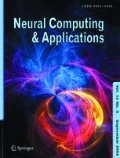Abstract
This paper introduces a novel hybrid adaptive cuckoo search (HACS) algorithm to establish the parameters of chaotic systems. In order to balance and enhance the accuracy and convergence rate of the basic cuckoo search (CS) algorithm, the adaptive parameters adjusting operation is presented to tune the parameters properly. Besides, the exploitation capability of the CS algorithm is enhanced a lot by integrating the orthogonal design strategy. The functionality of the HACS algorithm is tested through the Lorenz system under the noise-free and noise-corrupted conditions, respectively. The numerical results demonstrate that the algorithm can estimate parameters efficiently and accurately, and the capability of noise immunity is also powerful. Compared with the basic CS algorithm, genetic algorithm, and particle swarm optimization algorithm, the HACS algorithm is energy efficient and superior.




Similar content being viewed by others
References
Parlitz U (1996) Estimating model parameters from time series by autosynchronization. Phys Rev Lett 76(8):1232–1244
Sitz A, Schwarz U, Kurths J, Voss HU (2002) Estimation of parameters and unobserved components for nonlinear systems from noisy time series. Phys Rev E 66(1):016210–016223
Guo LX, Hu MF, Xu ZY (2013) Synchronization and chaos control by quorum sensing mechanism. Nonlinear Dyn 73(3):1253–1269
Abarbanel HDI, Rulkov NF, Sushchik MM (1996) Generalized synchronization of chaos: the auxiliary system approach. Phys Rev E 53(5):4528–4535
Quinn JC, Bryant PH, Creveling DR, Klein SR, Abarbanel HDI (2009) Parameter and state estimation of experimental chaotic systems using synchronization. Phys Rev E 80(1):016201–016213
Agiza HN, Yassen MT (2001) Synchronization of Rossler and Chen chaotic dynamical systems using active control. Phys Lett A 278(4):191–197
Garcia-Nieto J, Olivera AC, Alba E (2013) Optimal cycle program of traffic lights with particle swarm optimization. IEEE Trans Evol Comput 17(6):823–839
Salahi M, Jamalian A, Taati A (2013) Global minimization of multi-funnel functions using particle swarm optimization. Neural Comput Appl 23(7–8):2101–2106
Gandomi AH, Yang XS, Alavi AH (2011) Mixed variable structural optimization using firefly algorithm. Comput Struct 89(23–24):2325–2336
Chao T, Yu Z, Jack JJ (2007) Estimating system parameters from chaotic time series with synchronization optimized by a genetic algorithm. Phys Rev E 76(1):016209–016214
Deb K, Pratap A, Agarwal S (2002) A fast and elitist multiobjective genetic algorithm: NSGA-II. IEEE Trans Evol Comput 6(2):182–197
Yao L, Sethares WA (1994) Nonlinear parameter estimation via the genetic algorithm. IEEE Trans Signal Process 42(4):927–935
Yang XS, Deb S (2009) Cuckoo search via Lévy flights. Proceedings of world congress on nature & biologically inspired computing. IEEE Publications, UAS, pp 210–214
Yang XS, Deb S (2010) Engineering optimization by cuckoo search. Int J Math Model Num Opt 1(4):330–343
Amir HG, Yang XS, Amir HA (2013) Cuckoo search algorithm: a metaheuristic approach to solve structural optimization problems. Eng Comput 29(1):17–35
Li XT, Wang JN, Yin MH (2014) Enhancing the performance of cuckoo search algorithm using orthogonal learning method. Neural Comput Appl 24(6):1233–1247
Gandomi AH, Yang XS, Talatahari S, Deb S (2012) Coupled eagle strategy and differential evolution for unconstrained and constrained global optimization. Comput Math Appl 63(1):191–200
Long W, Liang X, Huang YF (2014) An effective hybrid cuckoo search algorithm for constrained global optimization. Neural Comput Appl 25(3–4):911–926
Zheng HQ, Zhou Y (2012) A novel cuckoo search optimization algorithm based on Gauss distribution. J Comput Inf Syst 8:4193–4200
Valian E, Mohanna S, Tavakoli S (2011) Improved cuckoo search algorithm for feedforward neural network training. Int J Artif Intell Appl 2(3):36–43
Ouaarab A, Ahiod B, Yang XS (2014) Discrete cuckoo search algorithm for the travelling salesman problem. Neural Comput Appl 24(7–8):1659–1669
Walton S, Hassan O, Morgan K, Brown MR (2011) Modified cuckoo search: a new gradient free optimization algorithm. Chaos Solitons Fractals 44(9):710–718
Yang XS, Deb S (2014) Cuckoo search: recent advances and applications. Neural Comput Appl 24(1):169–174
Payne RB, Sorenson MD, Klitz K (2005) The cuckoos. Oxford University Press, Oxford, pp 12–58
Barthelemy P, Bertolotti J, Wiersma DS (2008) A Lévy flight for flight. Nature 453(7194):495–498
Pavlyukevich I (2007) Lévy flight, non-local search and simulated annealing. J Comput Phys 226(2):1830–1844
Li XT, Yin XT (2012) Parameter estimation for chaotic systems using the cuckoo search algorithm with an orthogonal learning method. Chin Phys B 21(5):050507–050513
Leung TW, Wang Y (2001) An orthogonal genetic algorithm with quantization for global numerical optimization. IEEE Trans Evol Comput 5(1):41–53
Hick CR (1993) Fundamental concepts in the design of experiments. Saunders College Publishing, TX, pp 12–36
Montgomery DC (1991) Design and analysis of experiments. Wiley, New York, pp 10–21
Acknowledgments
This work is supported by National Natural Science Foundation of China under Grant No. 61271106.
Author information
Authors and Affiliations
Corresponding author
Rights and permissions
About this article
Cite this article
Wang, J., Zhou, B. A hybrid adaptive cuckoo search optimization algorithm for the problem of chaotic systems parameter estimation. Neural Comput & Applic 27, 1511–1517 (2016). https://doi.org/10.1007/s00521-015-1949-1
Received:
Accepted:
Published:
Issue Date:
DOI: https://doi.org/10.1007/s00521-015-1949-1




